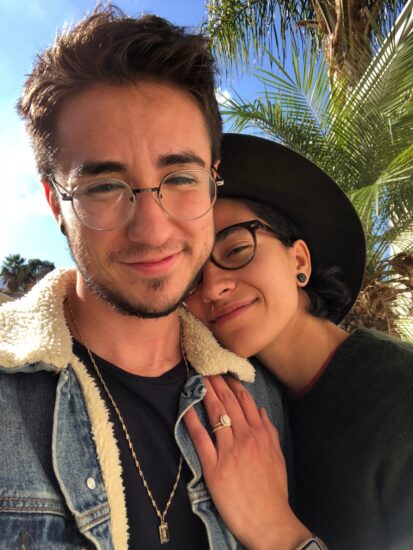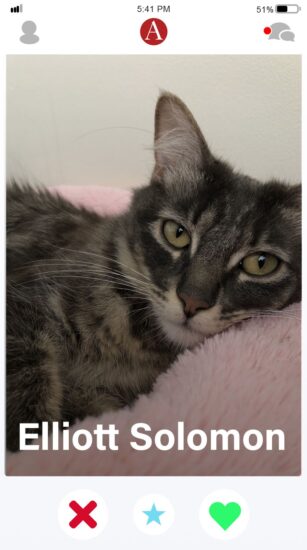Down for whatever
Not all dating apps are down with all intersections of queer identities

Gabriel Carcedo Cravens meets people on and off dating apps, goes on a date or two, then goes home to his wife to share how the night went. Carcedo Cravens is a trans man in an open marriage. His experience dating goes a lot different from the typical, heteronormative experience when dating, especially online.
“Navigating dating with other people while married in general is very difficult,” he said. “I think adding the apps can also make another aspect to it different. We kind of see how many people want your partner.”
Of course there will be some jealousy, Carcedo Cravens said. However, as part of being in an open relationship, he and his wife, Daphne Carcedo Cravens, set up general rules and courtesies, such as sharing when they would be going on a date to maintain transparency.
Dating apps only make it more complicated, especially when navigating online dating as a trans man.
“On Tinder I have to put that I’m a woman seeking a woman to talk to queer women,” he said. “I have to switch my settings if I want a particular type of person, but I make the assumption that straight girls are going to swipe left on me almost all the time so I’d rather put it out there that I am a trans man.”
Juggling between Grindr, Tinder, OKCupid and HER, Carcedo Cravens creates his own map to meet people. This is the same for many transgender and non-binary people using dating apps. Each experience is different, but there is a constant trend of troubles coming from dating apps with binary settings.
DATING IS NOW GAMEFIED
Part of the mystery of dating comes in the swipes. Apps like Tinder and Bumble supply users with a profile where they can put their favorite pictures and feature facts about themselves for others to get a glimpse into who they are.
Dating apps turned dating from something emotional into something more superficial, said Julie Albright, a USC psychology professor and author of “Left to Their Own Devices: How Digital Natives Are Reshaping the American Dream.”
“It’s very much like a Vegas slot machine,” Albright said. “You swipe and sometimes they swipe you, then you won.”
Albright described this phenomenon as ‘random reinforcement.’ Random reinforcement, or intermittent reinforcement, refers to the desire for a match. The desired response isn’t achieved every time, and therefore the user continues to swipe, waiting for the times they get the match.
“They figured out how to gamify dating such that the game of dating itself takes precedence over the outcome of that game,” Albright said. “[It is] pleasurable in and of itself to swipe. Gotta catch em all.”
Prior to apps, dating consisted of chatrooms and in-person interactions. There are a myriad of people available, and that surplus of options perpetuates the idea that there will always be someone else better out there, Albright said.
People learn about others on dating apps from the outside-in instead of inside-out, Albright said. Dating profiles reflect a person’s brand less than the actual person. People are now looking at the attractiveness of someone as the driving factor for dating unlike older versions of dating apps like OKCupid and chatrooms.
The swiping game is a business strategy, she said. The apps are a business, so to maintain their audience and profit, they heighten the risks of swiping. Gamified dating apps are a result of business and human superficiality.
Popular, mainstream dating apps delved into this culture, but smaller apps like HER that cater to lesbians and the genderqueer community focused on their audience to establish their format.
Robyn Exton, founder and CEO of HER, said her app puts community at the forefront of the dating app’s function.
“It has a more inclusive, community driven approach,” Exton said. “I believe most of the queer apps have come from a more masc(uline) perspective and that tends to be more quick and short interactions.”
HER offers both a dating and friendship function. Both Carcedo Cravens and Wang said they used HER to meet other queer folks. Carcedo Cravens even noted that he met other transgender friends on the app, and continues to talk to them through HER.
What HER offers is an experience for the trans and queer community unlike most dating apps.
People are less likely to date trans people than cisgender people. A 2017 survey conducted by YouGov found that cisgendered U.S. adults are less likely to date, either casually or seriously. Seventeen percent of those surveyed said they’d date a trans man, 16% said they’d date a trans woman and 18% said they’d date a non-binary individual.
One year later, a study published in the “Journal of Social and Personal Relationships” reported 12% of cisgender people surveyed say they considered dating trans people.
HER puts importance in connection and respect, which most apps like Tinder and Bumble don’t foster.
“HER we built very much thinking about community groups and the sub communities of different identities and I think it has much more of a friendship vibe to it,” Exton said.
Meanwhile, Tinder’s past campaign, “Single Not Sorry,” is based on the single life and sex with no strings attached, reaching their young college-aged audience. Each swipe offers a possible opportunity for sex. Their current campaign, “Chat. Match. Date.” offers a more serious take on the app, but still hints at the ephemerality of each swipe. Albright explained that it even creates a myth that the next swipe will be better than the one before.
“If I just keep on swiping I’m gonna find that person who is a little bit better,” she said. “Bottom line is that’s a myth and they’re just going to end up being lonely.”
Dating apps are games that never ends.
ARE YOU LOOKING?
Online dating as a trans individual can be dangerous, Carcedo Cravens said. He reported constant fear of transphobia while on the app.
“Having my face on there is putting myself at risk of violence, in general,” he said. “If I walk down the street and decline this guy, I don’t know if he’s going to be down this street. Him seeing me and knowing that I’m trans, and doing something to me because I have that on Grindr… it’s difficult to mostly deal with emotionally because I have to worry. Well, I don’t have to, but I do.”
Carcedo Cravens began altering between a faceless pic for his profile and one with his face because he feared people recognizing him in public. He is questioned by others on dating apps about his gender identity more often than he likes. People ask about his polyamorous relationship and sexuality without any promise of taking the conversation further, he said.
“I’m only going to answer these questions if you’re actually going to go on a date with me,” he said. “I understand that the person is like, I want to know. But you only have to know this if we’re going to be dating. Not if you’re going to think about going on a date.”
Finding dates as a transgender individual is not a pleasant task to pursue online. Wang and Carcedo Cravens expressed how Instagram eventually became a safe haven. Both said the social media app helped them connect with others in a more controlled way.
LEX AND THE FUTURE OF QUEER DATING APPS
When dating apps become too emotionally laborious and unproductive, many queer people have turned to other forms of communication. Carcedo Cravens said he turned to Instagram’s direct message feature to find people, especially to continue in-person conversations. After meeting someone in a bar or at an event, he found Instagram helpful in pursuing that new connection.
Queer people even turn to Instagram for personals. Personals, or personal ads, originated sometime in the 1690s, according to H.G. Cocks in his book “Classified: The Secret History of the Personal Column.” In these ads, people advertised themselves to readers as a potential love interest. This is where a world of impersonal introductions to dating began. Today personal ads come in the form of dating profiles.
Personal ads are not new to the queer community as well. They were later used during the early 1900s by the queer community when homosexuality was illegal in the UK. They came up with code phrases and words to discreetly find others.
Today, an Instagram account that previously went by PERSONALS is turning their online dating platform into an app by the name of Lex, @lex.app, short for lexicon. Their instagram account turned app echoes the history of personal ads by providing a platform for online personal ads by transgender and queer people.
The account now has about 61.4 thousand followers and provides a new, retro form of online dating for the queer community. On this platform, there are no restrictions to self-identification and there are no binary boxes needed to be filled. It is a community account that accepts submissions and connects the queer community in romantic and platonic ways.
Posts contain a quirky, sexy or earnest title and a blurb about the person who submitted the personal. From “SEARCHING FOR MY FOREVER” to “MURDER ME DADDY,” queer people have no limitations on what and who they are looking for in online dating. On Lex, it begins with words rather than photos of the person.
Founder Kell Rakowski got the idea for the instagram account from the first women-run erotica magazine of the 1980’s and 90’s, ‘On Our Backs,’ and started her venture with the dating and social platform through @h_e_r_s_t_o_r_y. After including personals on the account, the popularity of the personals led to a separate account under @_Personals_, and the popularity begged for an app.
Rakowski said she couldn’t keep up with the amount of submissions, leading her to the decision to turn it into an app. They are changing the dating app world by entering their project into the mix.
For people like Solomon and Wang, using dating apps are a lot more complicated because of the limitations to gender each app has. Online dating for transgender and queer people is difficult in a binary online environment heavily influenced by labels, Solomon said.
Rakowski noticed the lack of attention dating apps had on queer people and labels, catering specifically to cis, straight users.
“The thing that’s happening is there’s no one making something specifically for the queer community,” she said. “There’s this giant group of people that no one is really looking at and I’m trying to help build something so that’s really where I’m stepping up and trying to make that happen.”
Lex released on November 7 and is described in their press release as “a lo-fi, text-based dating and social app for lesbian, bisexual, asexual, and queer people. Lex is for womxn and trans, genderqueer, intersex, two spirit, and non-binary people, for meeting lovers and friends.”
Solomon succeeded in finding someone on dating apps outside the realm of Lex and HER, and even though there weren’t many labels available to use at the time, they found that labels have a significant influence in the queer community present online. There’s comfort in being able to define yourself in a society that differentiates people through labels, but it isn’t the only option, they said.
“There’s also to a certain extent where it’s just like, just say you like whatever man, just say ‘down for whatever,’” Solomon said.
 ELLIOTT
ELLIOTT